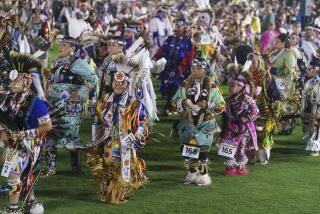Judge Won’t Block Gaming Pact
WASHINGTON — A federal judge on Friday refused to immediately derail an agreement between Gov. Pete Wilson and the Pala Indians allowing some reservation gambling, despite objections from two other California Indian tribes that the pact disregards state and federal laws and infringes on tribes’ sovereignty.
U.S. District Judge Thomas F. Hogan said the matter was not so urgent as to require him to temporarily restrain Interior Secretary Bruce Babbitt from signing the compact, which would set a precedent in California.
The judge did, however, invite the two tribes to continue pursuing their objections to the controversial agreement, if and when Babbitt does sign it.
During a 50-minute hearing, Hogan entertained the tribes’ argument that Wilson did not have the authority to sign the Pala pact without legislative ratification.
Wilson has maintained that legislative endorsement is not necessary, but he is nonetheless seeking it, and the issue is expected to be hotly debated on the Assembly floor Thursday.
“Who knows why the governor’s office would have proposed the legislation [to approve the agreement] if he thought he had the authority without it?” Hogan asked rhetorically.
Still, Hogan didn’t find the issue to be so critical as to warrant his intervention.
The compact, signed by Wilson and the Pala tribe last month, faces a Sunday deadline to be approved by Babbitt. He can also remain silent on the issue, which would still be interpreted as federal endorsement of the pact--the first in California allowing an Indian tribe to offer gambling that approaches a Las Vegas type of action.
A spokesman for Babbitt said Friday that he did not know Babbitt’s intentions.
Nearly 40 California tribes already run gambling casinos--in spite of Wilson’s long-held position that many of their gambling devices violate California laws that ban slot machines.
Federal authorities have said they will soon move on illegal casinos, now that at least one tribe--the Pala--and Wilson have defined what kind of reservation gambling is legal in the state. Federal law allows Indian casinos only when they are permitted by states through negotiated compacts.
In their federal lawsuit, the tribes contended not only that Wilson did not have the authority to unilaterally sign the compact but that, moreover, Wilson’s terms were more restrictive than allowed by federal law that regulates gambling on Indian reservations.
Wilson’s agreement, for instance, places a limit on the number of slot-like gambling machines that Indians can operate in California. Other tribes contend that such a restriction violates federal law.
The compact allows the small, impoverished Pala tribe in northern San Diego County to open a casino with electronic machines that offer speedier, high-tech versions of the kinds of lotto and scratch-off games offered by the California Lottery.
The lawsuit objecting to it was filed on behalf of the Pechanga Indians near Temecula and the San Manuel Indians near San Bernardino, each of which operate lucrative casinos that have more machines than Wilson would allow.
Lanny J. Davis, one of the tribes’ attorneys, said litigation to block the Pala agreement will be pursued and that U.S. Atty. Gen. Janet Reno was asked by the tribes Friday to intervene and mediate the California dispute.
Schultz reported from Washington and Gorman from Riverside.
More to Read
Sign up for Essential California
The most important California stories and recommendations in your inbox every morning.
You may occasionally receive promotional content from the Los Angeles Times.










